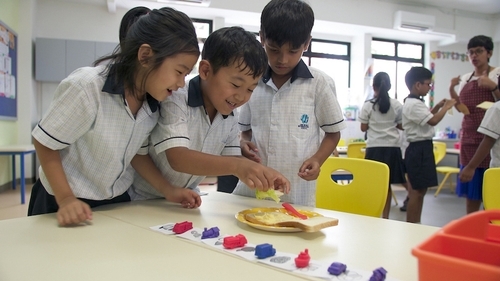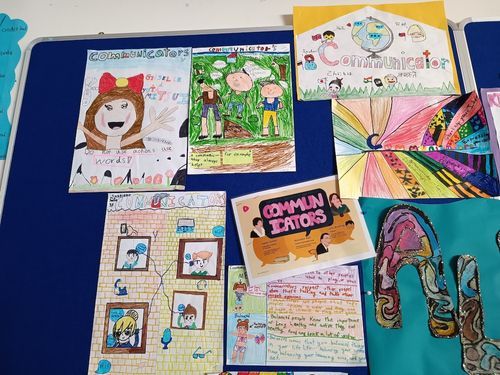Have you heard of the growth mindset? As a parent, it’s a term with which to become familiar. As opposed to a fixed mindset, a growth mindset enables a child to develop more and gain higher learning skills as they progress through school. The International Baccalaureate Primary Year Programme (IB PYP) fosters a growth mindset in children aged 3 to 11. It does so by encouraging open-mindedness and fostering a child’s natural curiosity. Instead of merely being “fed” information, young learners are coaxed to explore and experiment through hands-on learning activities.
Why Young Learners Should Develop a Growth Mindset
Given the proper tools, most of us use the growth mindset to master new skills. But children who have actively developed their growth mindset from early childhood are well situated to succeed in life as adults for several reasons:
- They are confident in their abilities to learn.
- They understand how to build upon prior knowledge.
- They have mastered the skills of questioning, theorising, and testing conclusions.
- They have open mindsets and will accept new information.
- They understand that there will always be someone who knows more than they know.
Children who actively develop their growth mindsets have little trouble applying what they’ve learned to everyday life. Furthermore, those who begin mastering critical thinking skills at an early age have a distinct advantage later in life. They go further with less stress and fewer setbacks. When they encounter obstacles, they’re able to reason a path around or over. As a result, the world becomes a wide-open playground of possibilities. It’s this approach that the IB PYP strives to replicate for every student.
What Is a Transdisciplinary Approach?
An easy way of explaining the transdisciplinary approach of the IB PYP is to picture a student who understands how to follow the recipe to bake a cake. They’re able to read the instructions, assemble the ingredients and combine everything to produce a well-baked confection. However, suppose the student also understands the science behind baking, such as how salt works together with baking powder and the effects of the eggs and oil on texture. In that case, they can substitute and experiment with ingredients, baking time and levels of heat and still produce a delicious cake. They’ve taken what they know and applied it to a real-life situation, using skills such as reasoning and concluding. As a result, they’re able to bake a tasty confection under even the most restrictive conditions. This student has gone a step beyond simply memorising a recipe. They’ve used the growth mindset to perform tasks in the actual world, building upon information learned in the classroom.
As part of a transdisciplinary approach, this same student may expand their knowledge by studying the country and region where ingredients such as sugar are grown. They may learn about diseases or pests that threaten sugar canes or recreate topographical maps of the area.

The transdisciplinary approach of IB PYP uses themes or units to explore topics across subjects. Across the primary school grades, it requires students to discover answers to these six themes continually:
- Who am I?
- Where am I in place and time?
- How does the world work?
- How can I best express myself?
- How do I organise myself with others?
- How do I share the planet successfully with others?
It’s this type of 360-degree-thinking that the IB PYP encourages in young students. For children in the Primary Years Programme, this is primarily accomplished through the use of question words.
What Are Questions Words?
Question words encourage critical thinking. They include:
- Who?
- What?
- When?
- Where?
- How?
- Which?
- Why?
When teachers use question words in their interactions with early learners, they prompt more in-depth thinking skills. This is also true for open-ended questions that can’t be answered by a simple yes or no. For example, when a child expresses an opinion about a food they don’t like, their teacher may ask them to think about why they don’t like it. Does it taste bad? How does it smell? What does it remind them of when they eat it? How could their parent prepare that same food to make it more tasty?
Similarly, this same technique transfers to academic subjects such as reading comprehension. Why did the character blow the house down? What did he think that behaviour would achieve? Was it the best approach? Or would a different approach have been more efficient in achieving the same goal? Students who master the skills of thinking beyond the obvious, of automatically moving to the next rung on the cognitive ladder, form healthy academic habits that benefit them far beyond school.
Goals of the IB PYP
Through the transdisciplinary and inquiry-based approach, the IB PYP strives to help students achieve the following skills:
- Thinking
- Self-managing
- Communicating
- Being social
- Researching
Under this umbrella of learning, children develop sub-skills in comprehension, application, time-management and presentation, to name only a few. In reality, this type of learning encourages many skills in early learners, from motor skill definition to recognising acceptable social behaviours. It gives children a solid cognitive foundation on which they can keep building as new knowledge arrives.
The IB PYP at One World International School (OWIS)
At One World International School in Singapore, we have adopted the IB PYP curriculum to encourage inquisitiveness and curiosity in young learners. In an OWIS classroom, under the guidance of our experienced teachers, they’ll learn collaboration and teamwork. They’ll receive the tools needed to open up their worlds and minds to global possibilities.
We also understand that developing a growth mindset in young learners goes beyond academic subjects. Our multicultural environment, which has students representing over 70 nationalities, fosters an interest in diversity and how there is so much to learn about in the world. Through our vibrant academic calendar, which celebrates different traditional holidays and festivals and value systems, such as kindness, we plant seeds in our students’ minds right from the early childhood and primary grade levels to keep growing holistically and not in a uni-dimensional way.
It’s a global world your child will enter when they leave school. You can ensure they have the growth mindset to make them well-prepared by enrolling them in the IB PYP at One World International School today.
Visit us online for a virtual tour, or call us today for more information. And please like and share this with your friends who are parents of primary-age children.
(All OWIS photographs in this blog article were taken pre-Covid. The school is adhering to hygiene protocols and social distancing measures as recommended by the CPE and Ministry of Health, Singapore.)
(This blog was originally written in collaboration with Ms Deepali Dharia, former Primary School Teacher, OWIS Nanyang.)














